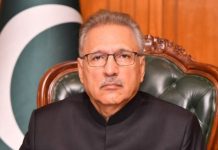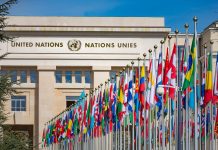A day-long provincial conference was held on promoting women’s property and inheritance rights in the Newly Merged Districts (NMDs) here on Thursday. The conference was organized by the Community Appraisal and Motivation Program (CAMP) in coordination with the Khyber Pakhtunkhwa Ombudsperson for Protection against Harassment of Women at Workplace Secretariat.
Rukhshanda Naz, Ombudsperson for Protection Against Harassment of Women at the Workplace, Khyber Pakhtunkhwa opened the conference by lauding the efforts of the KP government and civil society for collaborating on this important issue.
She spoke about the need for the language of laws to be gender sensitive. Rukhshanda Naz said we needed to make the conversation more vocal about ownership rather than just inheritance. Women’s unpaid work must be recognized and they must be made a part of ownership. She also reminded the participants that “the Khyber Pakhtunkhwa Enforcement of Women’s Property Rights Act” was not only about inheritance but about property of all types.
This Act aimed at providing protection to women of their rights of ownership and possession of properties owned by them, ensuring that such rights are not violated by any means of harassment, coercion, force or fraud and for the matters connected therewith or incidental thereto. Rukhshanda Naz acknowledged CAMP’s efforts for raising awareness about this law and spoke about how cases have started trickling in from NMDs due to such campaign.
CAMP’s CEO Naveed Ahmad Shinwari welcomed the speakers and guests to the conference.
He also thanked the stakeholders of the project including the Ombudsperson Secretariat, Commonwealth Foundation and local CSOs. Asad Ali and Mariam Khan introduced CAMP NGO and Da Khor Barkha Project.
Mufti Ghulam Majid, Senior Research Officer, Council of Islamic Ideology, Pakistan quoted from the Surah Al-Nisa in the Holy Qur’an which clearly states the inheritance rights of women.
He said it is very plainly stated that inheritance is something that happens automatically, whether or not the next of kin asked for it. He also explained the punishments that are attached with not giving the rightful share in inheritance. Mufti Majid also spoke about the contributions of the Council of Islamic Ideology, including a booklet detailing women’s inheritance rights, which has been published.
Dr. Noreen Naseer, Assistant Professor, Political Science Department, University of Peshawar, & Member KPCSW spoke about the traditions of the NMDs and why women are not given their property rights. She said unfortunately women are considered property, and highlighted traditions such as badala and swara which exchange women like they are property. These traditions need to be challenged and that will not happen until women own property or receive their rightful inheritance. If we start challenging these structures and values, and start educating girls, a lot of our issues can be resolved. 51% of the population in NMDs are women, which is a strong force, she added.
Dr. Sameena Afridi, Lecturer, University of Peshawar, & Member KPCSW stressed on the needs for advocacy and awareness on this important issue. She spoke about the customary law which prevailed when Pakistan came into being, and because of that women’s right to property was generally not given. Although the situation in the rest of the country changed gradually, unfortunately for women from NMDs, it has taken much longer. Two main hurdles that we see are traditions – such as not considering the woman an individual, and to stop considering her a commodity, or if shajras are taken out, women’s names will not appear. The other issue is that while some districts had land records, most districts did not.
The protection of institutions and state machinery needs to be extended so that people in NMDs, and especially women, can claim their rights to property and inheritance. These two issues will need to be dealt with in parallel for a change to be made. At the end she stressed on the need for digitalization to avoid delays and tampering of land records.
Younas Afridi, President, Khadimul Khalaq Foundation, Khyber district represented the network of 30 CSOs which are working in partnership with CAMP and the Ombudsperson Secretariat to implement small awareness activities in the NMDs of KP. He presented the activities of KKF implemented in Khyber district including information sessions with local journalists, Jirga meetings with religious elders and tribal leaders, sessions with law enforcement representatives, community meetings with men and women, radio and print campaigns for awareness and facilitating women to submit cases related to property with the Ombudsperson Secretariat.
The participants included the Chairperson of the NCHR, lawyers forums, media and NGO representatives and others.
The collaborative efforts of the Ombudsperson Secretariat and CAMP will promote women’s right to inheritance in Newly Merged Districts (NMDS) of Khyber Pakhtunkhwa province, where women are deprived of their share in inheritance. Although laws have been extended to the former tribal belt after it was ‘merged’ with Khyber Pakhtunkhwa province in May 2018, local ‘rewaj’ (traditions) and lack of administrative structures hindered implementation.
The project will support civil society to raise awareness among the local population and advocate with provincial legislators and law enforcement departments for the implementation of provincial inheritance law. The project is supported by the Commonwealth Foundation.













